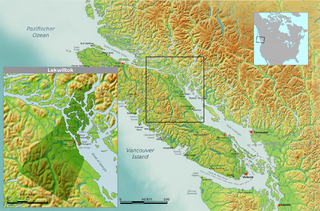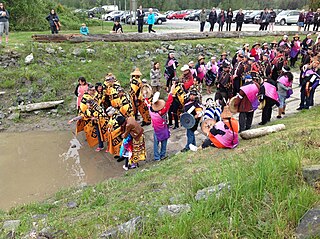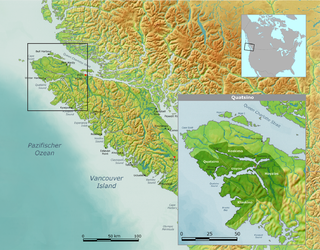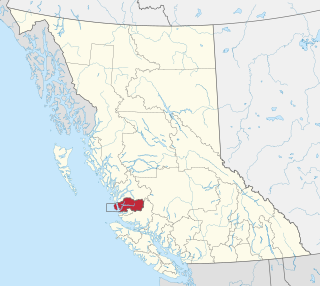Related Research Articles

The Kwakwa̱ka̱ʼwakw, also known as the Kwakiutl, are one of the indigenous peoples of the Pacific Northwest Coast. Their current population, according to a 2016 census, is 3,665. Most live in their traditional territory on northern Vancouver Island, nearby smaller islands including the Discovery Islands, and the adjacent British Columbia mainland. Some also live outside their homelands in urban areas such as Victoria and Vancouver. They are politically organized into 13 band governments.

The Kʼómoks or Kʼomoks, usually known in English as the Comox, are an indigenous group of Coast Salishan-speaking people in Comox, British Columbia and in Toba Inlet and the Malaspina Peninsula areas of the British Columbia mainland across Georgia Strait. They historically spoke the Komox language (Comox-Sliammon), and were divided in two main dialect and tribal groupings, which are known by academics as Island Comox and Mainland Comox.

Quadra Island is a large island off the eastern coast of Vancouver Island, in British Columbia, Canada. It is part of the Discovery Islands, in the Strathcona Regional District.

Wakashan is a family of languages spoken in British Columbia around and on Vancouver Island, and in the northwestern corner of the Olympic Peninsula of Washington state, on the south side of the Strait of Juan de Fuca.

Laich-kwil-tach, is the Anglicization of the Kwak'wala autonomy by the "Southern Kwakiutl" people of Quadra Island and Campbell River in British Columbia, Canada. There are today two main groups : the Wei Wai Kai and Wei Wai Kum just across on the Vancouver Island "mainland" in the town of Campbell River. In addition to these two main groups there are the Kwiakah originally from Phillips Arm and Frederick Arm and the Discovery Islands, the Tlaaluis (Laa'luls) between Bute and Loughborough Inlets—after a great war between the Kwakiutl and the Salish peoples they were so reduced in numbers that they joined the Kwiakah—and the Walitsima / Walitsum Band of Salmon River.

Kwantlen First Nation is a First Nations band government in British Columbia, Canada, located primarily on McMillan Island near Fort Langley. The Kwantlen people traditionally speak hən̓q̓əmin̓əm̓, the Downriver dialect of Halkomelem, one of the Salishan family of languages.

The Quatsino First Nation is the First Nations band government of the Gwat'sinux subgroup of the Kwakwaka'wakw peoples, based in the Quatsino Sound region on the west coast of northern Vancouver Island in British Columbia, Canada, focused on the community of Coal Harbour in Quatsino Sound. It is a member of the Kwakiutl District Council and, for treaty negotiation purposes, the Winalagalis Treaty Group which includes three other members of the Kwakiutl District Council (the Da'naxda'xw Awaetlatla Nation, Gwa'Sala-Nakwaxda'xw Nation, and the Tlatlasikwala Nation.
The Kwakiutl District Council, also spelled Kwakwewlth District Council and Kwakiuth District Council, pronounced Kwagiulth District Council, is a First Nations Tribal Council based on Vancouver Island in British Columbia, Canada, based in the community of Campbell River, British Columbia in the northern Strait of Georgia but including member nations spanning northern Vancouver Island as far as Quatsino Sound. The nations represented within the Kwakiutl District Council are all Kwakwaka'wakw.

The Wuikinuxv Nation, also known as the Oweekeno Nation, is a First Nations band government whose traditional territory is the shores of Rivers Inlet and Owikeno Lake in the Central Coast region of the Canadian province of British Columbia, in the area south of Bella Bella and north of Queen Charlotte Strait. The Wuikinuxv people a.k.a. the Oweekeno people reside in the area of Rivers Inlet and Owikeno Lake, primarily at a village on the Wannock River. Substantial numbers of Wuikinuxv also reside away from the traditional territory in Port Hardy on Vancouver Island and in larger BC communities such as Campbell River, Vancouver and Victoria. Approximately 80 people reside at the village while overall membership was 283 in 2006, 194 of whom lived off-reserve.

Kwaguʼł are a Kwakwakaʼwakw tribe of the Indigenous peoples of the Pacific Northwest Coast from central British Columbia, on northern Vancouver Island. Their main community is called Tsax̱is or Fort Rupert. The ancestral language is Kwakʼwala, a language that is a part of the Wakashan language group. In their language, Kwaguʼł translates to Smoke-Around-the-World referring to the smoke that exited from the many bighouses in their villages.

The ƛoʔos Klahoose are one of the three groups comprising the ʔayʔaǰuθəm Tla'Amin or Mainland Comox. The other two divisions of this once-populous group are the χʷɛmaɬku Homalco and Sliammon. The Klahoose, Homalco and Sliammon are, according to oral tradition, the descendants of the survivors of the Great Flood. The three groups were split by colonialism into different band councils but united historically as the Tla A'min, known as the Mainland Comox, and K’ómoks, the larger grouping of the Comox people, also known as the Island Comox and before the merger with the Laich-kwil-tach culture. Historically both groups are a subgroup of the Coast Salish though the K’ómoks name is from, and their language today, is the Lik'wala dialect of Kwak'wala. The ancestral tongue is the Comox language, though the Sahtloot/Island dialect is extinct.
The Kitasoo/Xaixais First Nation, also known as the Kitasoo/Xaixais Nation, is the band government of the First Nations people of Klemtu, British Columbia, Canada. The band comprises two ethnic groups who share an ancient alliance, the Kitasoo, a Tsimshian group, and the Xai'xais, a north-wakashan speaking group. The government is a member of the Oweekeno-Kitasoo-Nuxalk Tribal Council and a member of the Tsimshian First Nations treaty council.
The Hamatla Treaty Society handles Treaty negotiations in the BC Treaty Process for a number of First Nations located in the northern Strait of Georgia of British Columbia.
The We Wai Kai Nation, also known as the Wewaikai First Nation, the Cape Mudge First Nation and the Cape Mudge Indian Band, is the band government of the We Wai Kai subgroup of the Laich-kwil-tach group of the Kwakwaka'wakw peoples, based on Quadra Island offshore from Campbell River, British Columbia, Canada, which is on the east coast of Vancouver Island at the northern end of the Strait of Georgia. The Laich-kwil-tach include the Wei Wai Kum, who are organized as the Campbell River First Nation, and the Kwiakah Nation, whose traditional territory is in the Discovery Islands to the northeast of that city and on the adjoining mainland coast. All three are part of the Kwakiutl District Council, a tribal council which includes other Kwakwaka'wakw bands farther northwest in the Queen Charlotte Strait region and on northern Vancouver Island.

The Campbell River First Nation (Wei Wai Kum) are the band government of one of the component groups of the Laich-kwil-tach or Southern Kwakiutl subgroup of the Kwakwaka'wakw peoples, based at the city of Campbell River. They are part of the Hamatla Treaty Society.
The Tseycum First Nation is a First Nations government located on Vancouver Island. In the 1850s they were signatories to the Douglas Treaties.
The Aitchelitz First Nation, also known as the Aitchelitz Band, is a First Nations band government of the Sto:lo people, located at Sardis, British Columbia, Canada (Chilliwack). It is a member of the Sto:lo Nation tribal council.
The K'ómoks First Nation, is the Indigenous band government of the Island Comox or K'ómoks people of Vancouver Island, British Columbia, Canada. Closely allied to the Cape Mudge and Campbell River First Nations, historically they were a Coast Salish people since integrated into Kwakwaka'wakw society. Originally part of the Laich-kwil-tach Council of Chiefs, which is a treaty society, they are now negotiating independently in the BC Treaty Process. They remain a member government of the Kwakiutl District Council.
Bill Wilson is a hereditary chief, politician, and lawyer. He carries the Kwak’wala name Hemas Kla-Lee-Lee-Kla. Hemas means “the Chief who is always there to help” and Kla-Lee-Lee-Kla means “the first rank among the eagles.” He is a descendant of the Musgamgw Tsawataineuk and Laich-kwil-tach peoples, which are part of the Kwakwaka'wakw, also known as the Kwak’wala-speaking peoples.
References
- 1 2 "Kwiakah First Nation" . Retrieved August 14, 2009.
- ↑ "Indian and Northern Affairs Canada, Reserves/Settlements/Villages Detail, Kwiakah First Nation". Crown–Indigenous Relations and Northern Affairs Canada . Government of Canada.
- ↑ "Kwakiutl District Council". Crown–Indigenous Relations and Northern Affairs Canada . Government of Canada. 2009.
- 1 2 "Hamatla Treaty Society". Executive Council of British Columbia. 2009. Retrieved July 26, 2009.
- ↑ "Laich-kwil-tach Treaty Society" . Retrieved August 14, 2009.